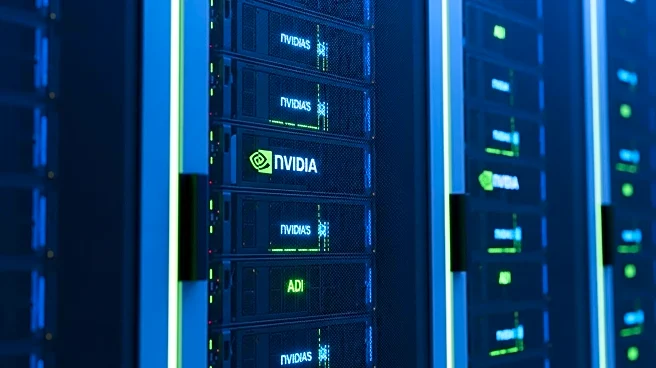What is the story about?
What's Happening?
NVIDIA is solidifying its position as a leader in AI infrastructure, with analysts from JPMorgan and Jefferies upgrading their ratings and price targets for the company. NVIDIA's dominance is underscored by its commanding 86% market share in AI GPUs, which are crucial for data center AI workloads. The company's fiscal 2025 revenue is projected to reach $130.5 billion, driven by high demand for its Hopper and Blackwell GPUs. These GPUs are sold out globally, indicating a strong supply-demand imbalance favoring NVIDIA. The AI chip sector is expected to grow from $40.79 billion in 2025 to $165 billion by 2030, highlighting NVIDIA's strategic importance in the AI-driven semiconductor ecosystem.
Why It's Important?
NVIDIA's leadership in AI infrastructure has significant implications for investors and the broader technology industry. As AI capital expenditures reach critical mass, NVIDIA's integrated ecosystem offers a competitive advantage that rivals struggle to match. The company's hardware and software solutions, along with partnerships with cloud providers, create a robust moat. This positions NVIDIA as a key enabler of the transition from experimental to operational AI, promising sustained revenue growth and margin resilience. Investors are urged to consider NVIDIA as a cornerstone of their long-term portfolios, given the exponential growth forecasted in AI infrastructure spending.
What's Next?
With AI infrastructure spending hitting critical mass in 2025, NVIDIA's role in the industry is expected to deepen. The company will continue to benefit from advancements in chip fabrication and increased AI adoption across various sectors. As demand for high-performance computing solutions grows, NVIDIA's strategic partnerships and ecosystem advantages will likely drive further revenue growth. Investors and stakeholders should monitor the company's developments closely, as delays in capitalizing on this opportunity could result in missing out on significant gains.
Beyond the Headlines
NVIDIA's dominance in AI infrastructure not only impacts the technology sector but also raises ethical and cultural considerations. The widespread adoption of AI technologies could lead to shifts in workforce dynamics, privacy concerns, and the need for regulatory frameworks. As AI becomes more integrated into daily life, stakeholders must address these implications to ensure responsible and equitable use of technology.















